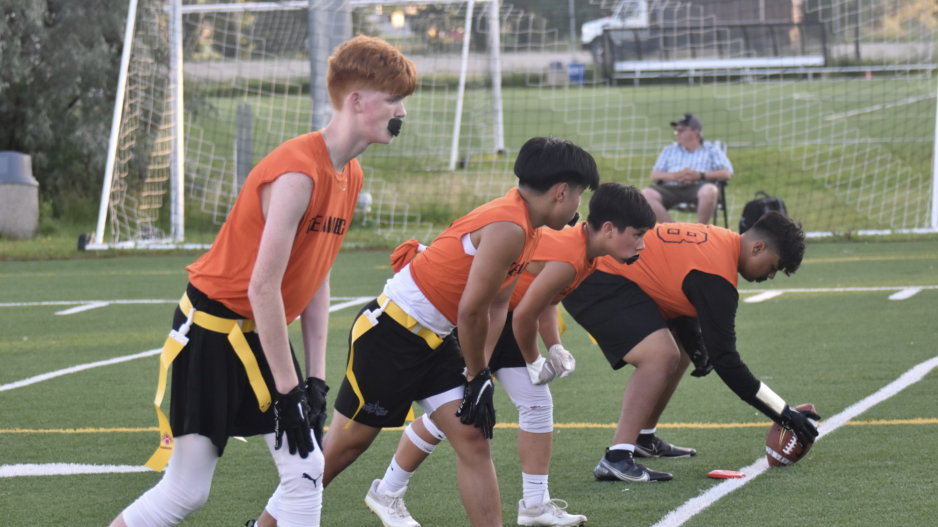When Los Angeles previously hosted the Summer Olympics in 1984, rhythmic gymnastics debuted and a Vancouverite, Lori Fung, won the first gold medal in the all-around category.
Could lightning strike twice for Canada when the five-ring circus returns to the City of Angels in 2028?
On Monday in Mumbai at its annual meeting, the International Olympic Committee (IOC) voted to add flag football and squash and welcome back baseball and softball, lacrosse and cricket to an already crowded program. This means more opportunities for elite B.C. athletes, coaches and officials, not to mention sport organizations seeking more registrants, sponsors and media attention.
“The original number was 10,500 athletes, I'm not sure what the equation is to get all of those sports into the Olympic calendar at LA28,” said Football Canada’s Bowen Island-based president Jim Mullin. “I'm just happy that we're there as a sport, the dividend that it will pay back to not just football in Canada, but global football.”
Mullin said the hotbed for flag football in Canada is Ontario, where, in the space of two years, registration has soared from 3,800 to 21,000 players. It’s affordable and accessible, and participation skews younger. Without contact, parents worry less about safety. Their children still learn about football basics, should they decide to play the tackle version later.
“There’s an opportunity to really jumpstart flag development here in B.C.,” Mullin said. “We’ve been a little bit behind the curve, in comparison to central Canada and Saskatchewan.”
The NFL sponsored the flag football tournament at the 2022 World Games in Birmingham, Ala. and transformed its annual Pro Bowl all-star game into a flag football tournament earlier this year. Locally, BC Lions owner Amar Doman has sponsored the North Vancouver Flag Football League.
At the World Games, an audition for the Olympics, eight nations played five-on-five flag football on a 50-yard field in men’s and women’s divisions, though Canada was not entered. At July’s International Federation of American Football Americas Championship, U.S. won both golds over Mexico. Canada finished third in the women’s tournament but lost the men’s bronze to Panama.
“We have to be on our game, we have to be internationally competitive,” Mullin said. "If there's a limited number of teams, both on the men's and women's side, qualification will be a challenge through the Americas.”
B.C. Lacrosse Association president Gerry Van Beek said executives from both sides of the border who lobbied the IOC to bring back lacrosse after a 120-year absence were inspired by the success of other sports that successfully adapted to fit into the Olympics: Rugby sevens, three-on-three basketball and two-on-two beach volleyball.
“The sixes format was really developed with the Olympics in mind, because it can be played in non-traditional areas like Kenya, Argentina, they can play this version without huge expense or facilities,” Van Beek said. “In order for lacrosse to grow, it has to become more international.”
The ball was already in motion in 2016, the year before L.A. was awarded 2028 hosting rights. That is when the Federation of International Lacrosse brought its Under-19 Men’s Field Lacrosse World Championship to Coquitlam. U.S. beat Canada for the gold and Iroquois Nationals won bronze. Organizers were already promoting the spread of the field game, pointing to the 10 other participating nations that included China, Taiwan, Hong Kong, South Korea, Ireland and Israel.
Van Beek said B.C. has 20,000 participants in organized box and field leagues, some of whom play both disciplines. The 2028 Olympics will showcase athletes born this millennium with high hopes for B.C. athletes to play a major role in the national team, which will have a roster of about a dozen.
“It's pretty selective and we could probably field five competitive teams, but it's only going to be one and I'm quite excited about it,” Van Beek said.
Under pressure to reduce the size and cost of the Summer Games, the IOC went the other way. Before Rio 2016, it voted to add new sports for Tokyo 2020, including skateboarding, sport climbing and surfing, in an effort to lure a younger viewing demographic.
For LA28, the IOC thinks it can draw more professional stars to give a boost to sponsors and broadcasters. President Thomas Bach specifically mentioned the long alliance with the NBA as a model, as the IOC imagines “an even closer cooperation, given the ever-growing importance of these professional leagues.”
Thirty-seven years ago this week, at its 91st general assembly, IOC members voted to open the Games to professional athletes.




